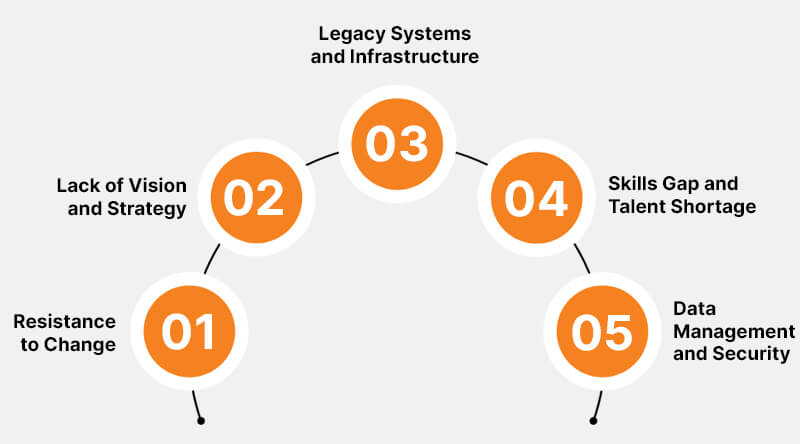In today’s rapidly evolving business landscape, digital transformation has become more of a necessity than a luxury for enterprises seeking to remain competitive and relevant. Digital transformation involves the integration of digital technologies and tools into all aspects of an enterprise’s operations and business model. This enables businesses to streamline operations, enhance customer experiences, and gain a competitive advantage.
However, implementing successful digital transformation is a challenging feat. The journey towards digital transformation is riddled with challenges and obstacles that enterprises must overcome to succeed in their digital journey. In this article, we will explore five of the biggest challenges to successful digital transformation in an enterprise and strategies to overcome them.
Find out Digital Transformation Trends That Every Business Need in 2023.
Challenges to Successful Digital Transformation

1. Resistance to Change
One of the biggest challenges to digital transformation is resistance to change. Employees may resist changes to processes, systems, and tools they have used for years. This can lead to a need for more adoption of new technologies and processes, making it difficult for software development companies to achieve their digital transformation goals. Resistance to change may stem from a need for more understanding of the benefits of digital transformation, fear of job loss, or concerns about the complexity of new technologies.
Solution
One of the most important strategies for overcoming resistance to change is to build a digital culture within the enterprise. This involves creating a sense of excitement and enthusiasm for digital transformation among all stakeholders, from the C-suite to front-line employees. Leaders must communicate the benefits of digital transformation, establish a sense of urgency, and involve employees in the process. This can be achieved through various channels, such as training programs, workshops, and internal communications.
2. Lack of Vision and Strategy
Another common challenge is the need for a vision and strategy for digital transformation. Enterprises may need help to prioritize initiatives and allocate resources effectively. A lack of strategy can also lead to disjointed efforts, with different departments pursuing their digital transformation projects independently, without a cohesive plan. This can result in duplication of efforts and inefficient use of resources.
Solution
Developing a comprehensive strategy for digital transformation is critical for success. This strategy should include a clear vision, specific goals, and a roadmap for implementation. In addition, the strategy should be based on a thorough understanding of the enterprise’s strengths, weaknesses, opportunities, and threats (SWOT analysis). Finally, a comprehensive strategy will help ensure that everyone in the enterprise works towards the same goals and that resources are allocated effectively.
3. Legacy Systems and Infrastructure
Legacy systems and infrastructure can significantly challenge digital transformation. Many enterprises have invested heavily in their IT infrastructure over the years, and these systems may need to be updated, inflexible, and incompatible with modern technologies. As a result, modernizing legacy systems can be a lengthy and expensive process, requiring significant time and resources. Also, legacy systems may pose security risks, making them unsuitable for sensitive data handling.
Solution
Legacy systems and infrastructure can be significant roadblocks to digital transformation. Modernizing legacy systems can ensure that new technologies can be integrated smoothly. This may involve replacing outdated hardware, upgrading software, or migrating to cloud-based systems. The modernization process should be carefully planned to minimize disruptions to day-to-day operations and ensure that data is transferred securely.
4. Skills Gap and Talent Shortage
The skills gap and talent shortage are other challenges facing enterprises undergoing digital transformation. The rapid pace of technological change means many employees may need more skills and expertise to implement new technologies effectively. Additionally, the competition for digital talent is fierce, making it difficult for Enterprises to recruit and retain skilled employees. This can lead to delays in implementing digital transformation initiatives and may require additional investment in training and development programs.
Solution
Investing in employee training and development is crucial for bridging the skills gap and ensuring employees have the digital skills to execute the enterprise’s transformation plans. This may involve providing training on data analytics, artificial intelligence, and other emerging technologies. Companies should also encourage continuous learning and development to keep employees updated with technological advancements.
5. Data Management and Security Concerns
Finally, data management and security concerns significantly challenge digital transformation. Enterprises must ensure that their data management and security policies are up-to-date and effective as they become more data-driven. This may involve implementing new technologies, such as artificial intelligence and machine learning, to analyze and manage large amounts of data. However, these technologies may also pose security risks, requiring enterprises to implement robust security measures to protect against data breaches and cyber-attacks.
Solution
Enhancing data management and security measures is essential for protecting the company’s valuable data. This involves developing data storage, backup, and recovery policies and measures to protect against cyber threats and breaches. In addition, companies should establish clear guidelines for data access, use, and sharing and ensure employees are trained on best practices for data security.
Wrapping Up
Digital transformation is a complex process that presents many challenges to enterprises. Overcoming these challenges requires a concerted effort. However, even with these measures, some enterprises may still need more in-house talent and expertise to achieve their digital transformation goals.
In such cases, outsourcing development can be an effective solution. Outsourcing software developers can help enterprises access the expertise and resources needed to implement digital transformation initiatives successfully. By partnering with a trusted development partner, businesses can leverage the experience and skills of a team of professionals who can guide them through the complexities of digital transformation.
With the right partner, companies can unlock the full potential of digital technologies and position themselves for success in the digital age.
Boost business with digital transformation.
Hire Resources Now!
Summary
Kickstart Your Project With Us!
Popular Posts
CONTACT US
Let's Build Your Agile Team.
Experience Netsmartz for 40 hours - No Cost, No Obligation.
Connect With Us Today!
Please fill out the form or send us an email to







